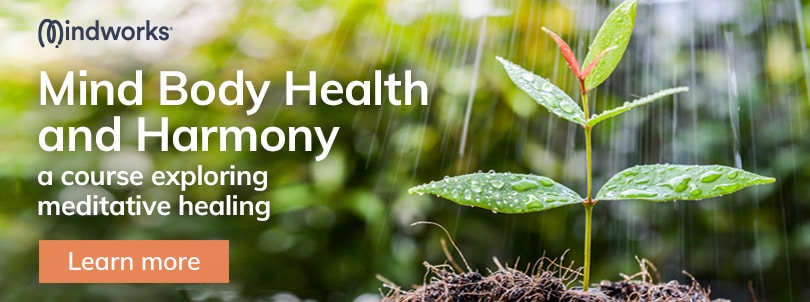Mindfulness and Healing
Category: Benefits of Meditation | Health and Meditation | Meditation and the Brain | Mind Trainer Articles | Stress and Anxiety

The importance of mindfulness to self-regulate and build resilience
As a physician who practices mind-body medicine, I truly believe that mindfulness is the most powerful tool that I have. I share it with my patients so that they have access to this tool as well. Mindfulness is more powerful than any drug, surgery, or other medical intervention, yet far too many patients aren’t even aware that this tool exists. They don’t need to consult with medical practitioners or go anywhere else to access it. The ability to be mindful is with them 24/7.
Mindfulness might be defined as “acute awareness.” This awareness is key, right here and right now: awareness of moment-to-moment interactions, thoughts, sounds, smells, and so on. The other important mindfulness component is to refrain from judgment. It’s the ability to accept just what is: to sit with mindfulness of emotions, feelings, thoughts, and expressions, whether they seem to be putting us in a good place or a negative one. There’s no need to judge the feelings, no need to entertain feelings of self-loathing or self-hatred that arise because of them. We can just be with them. This practice of stillness, of being able to simply remain aware—whatever it is we may be aware of—with acceptance has great benefits from a physical standpoint as well as from an emotional and mental one.
To my mind, the biggest impact that mindfulness has is that it allows us to self-regulate and build resilience. Mindfulness can affect the ruminations that are commonly tied to anxiety or depression, for example, where we experience repetitive negative thoughts. Mindfulness helps us quiet those voices and focus. In addition, it helps us improve our working memory. And in terms of the cardiovascular system, it downregulates blood pressure and heart rate. It also downregulates neurotransmitters such as adrenaline, norepinephrine, and cortisol levels. It lowers inflammation and helps increase immunity. That’s why, as a non-pharmacologic, therapeutic intervention, mindfulness is the one thing I always introduce my patients to and encourage them to learn more about.
To illustrate the importance of mindfulness, let us look at an emotion like anger. I think everyone can relate to anger—we all know what this emotional state of mind feels like. So what do we do with it? Mind you, I’m not talking about trying to repress anger or pretend it isn’t happening because it’s there, whatever the trigger may be. But when faced with a situation that provokes it, people generally want to feel validated about anger as an emotional response—they want to stay with it and justify it. And so they build a story, and the story builds and builds and the anger begins to feel more justified than the initial situation even deserved.
We have the power to choose a different path. We can say, “Okay, he cut me off,” or “She was rude to me.” And we can start by having compassion for that person. We can consider that maybe they’re having a tough day. Maybe they’re rushing to take their wife to the hospital because she’s about to deliver. Or maybe something’s going on in their life that just has them in a bad space. We can choose to start with that consideration and not be so offended by whatever was said or done. By giving our minds space to create a different story about why that challenging interaction or situation took place, we can allow our anger to dissipate.
That’s really what mindfulness does. Mindfulness allows us to take a moment to pause and remain with whatever the situation is. We don’t have to create a negative story around it or judge it; we can just let it be for a moment. And then we can summon qualities that we all possess and put into practice in our lives. We can focus on being loving; we can have compassion and empathy, right? We can apply those feelings and emotions to any situation to help us neutralize our anger.
It’s essential for patients to understand that their emotions don’t have to rule them. We have control over how we choose to react to any situation in terms of our attitude and behavior. When we practice mindfulness, our emotions—the gateway to the unconscious—change because we are rewinding our neurocircuitry and altering our response mechanism. Usually our reactions are instantaneous, automated reflexes, but when we are mindful, instead of reacting we can truly allow ourselves to respond.
A lot of patients think that things are happening to them: my stress, my work, my children, my environment, and so on. I always tell patients that stress is an inside-out job. Circumstances are present that can happen to anyone; we all have to deal with situations that provoke negative emotions. But what really affects us on a cellular or physical level is not our outside feed, it’s our inside response. It’s how we choose to respond to whatever the situation may be. We can influence the stories we build around it—we absolutely have control over stress!
Check out Dr. Cynthia’s article on Physical Health and the Mind Body Connection. She is also a featured Mind Trainer in our online meditation course on mind body and their relationship to health. Watch the video below for highlights:







